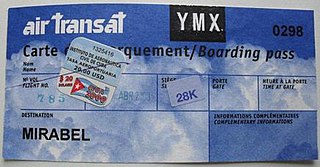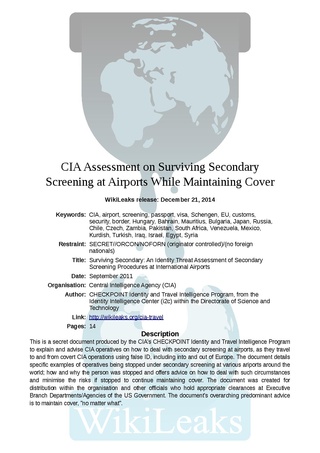After the September 11 attacks, there was an immediate call to action regarding the state of aviation security measures as the hijackers involved in 9/11 were able to successfully pass through security and take command of the plane. The existing security measures flagged more than half of the 19 hijackers in 9/11; however, they were cleared to board the plane because their bags were not found to contain any explosives. In the months and years following September 11, 2001, security at many airports worldwide were reformed to deter similar terrorist plots.

The Transportation Security Administration (TSA) is an agency of the United States Department of Homeland Security (DHS) that has authority over the security of transportation systems within, and connecting to the United States. It was created as a response to the September 11 attacks to improve airport security procedures and consolidate air travel security under a dedicated federal administrative law enforcement agency.

Airport security includes the techniques and methods used in an attempt to protect passengers, staff, aircraft, and airport property from malicious harm, crime, terrorism, and other threats.
The No Fly List, maintained by the United States federal government's Terrorist Screening Center (TSC), is one of several lists included in algorithmic rulesets used by government agencies and airlines to decide who to allow to board airline flights. The TSC's No Fly List is a list of people who are prohibited from boarding commercial aircraft for travel within, into, or out of the United States. This list has also been used to divert aircraft away from U.S. airspace that do not have start- or end-point destinations within the United States. The number of people on the list rises and falls according to threat and intelligence reporting. There were reportedly 16,000 names on the list in 2011, 21,000 in 2012, and 47,000 in 2013.

The Federal Air Marshal Service (FAMS) is a United States federal law enforcement agency under the supervision of the Transportation Security Administration (TSA) of the United States Department of Homeland Security (DHS).

Backscatter X-ray is an advanced X-ray imaging technology. Traditional X-ray machines detect hard and soft materials by the variation in x-ray intensity transmitted through the target. In contrast, backscatter X-ray detects the radiation that reflects from the target. It has potential applications where less-destructive examination is required, and can operate even if only one side of the target is available for examination.
Security theater is the practice of taking security measures that are considered to provide the feeling of improved security while doing little or nothing to achieve it.

A boarding pass or boarding card is a document provided by an airline during airport check-in, giving a passenger permission to enter the restricted area of an airport and to board the airplane for a particular flight. At a minimum, it identifies the passenger, the flight number, the date, and scheduled time for departure. A boarding pass may also indicate details of the perks a passenger is entitled to and is thus presented at the entrance of such facilities to show eligibility.

Frisking is a search of a person's outer clothing wherein a person runs their hands along the outer garments of another to detect any concealed weapons or objects.

Secondary Security Screening Selection or Secondary Security Screening Selectee, known by its initials SSSS, is an airport security measure in the United States which selects passengers for additional inspection. People from certain countries are subject to it by default. The passengers may be known as Selectee, Automatic Selectee or the Selectee list. The size and contents of the list fluctuates and is a secret, although the Transportation Security Administration has stated there are tens of thousands of names on it.

A full-body scanner is a device that detects objects on or inside a person's body for security screening purposes, without physically removing clothes or making physical contact. Unlike metal detectors, full-body scanners can detect non-metal objects, which became an increasing concern after various airliner bombing attempts in the 2000s and some scanners can also detect swallowed items or hidden in body cavities of a person. Starting in 2007, full-body scanners started supplementing metal detectors at airports and train stations in many countries.

Raed Jarrar is an Arab-American architect, blogger, and political advocate based in the U.S. Capital Washington, DC.
Sharon Marie Cissna is an American politician and former Democratic member of the Alaska House of Representatives, representing the 22nd District from 1999 to 2013.

A millimeter wave scanner is a whole-body imaging device used for detecting objects concealed underneath a person’s clothing using a form of electromagnetic radiation. Typical uses for this technology include detection of items for commercial loss prevention, smuggling, and screening for weapons at government buildings and airport security checkpoints.
The concept of border security in the United States shares a complex relationship with the persistent threat of terrorism. Border security includes the protection of land borders, ports, and airports. The relationship is unique in the sense that the federal government must constantly reevaluate and tweak its border security policy to address the perceived threats posed to the United States through the form of human terrorism or the smuggling and detonation of a weapon of mass destruction.
Airport racial profiling in the United States is U.S. government activity directed at a suspect or group of suspects because of their race or ethnicity. Under analysis Fourth Amendment to the United States Constitution, objective factors measure whether law enforcement action is constitutional, and under the Fourteenth Amendment challenges to the practice are assessed under the customary strict scrutiny test for racial classifications.

A Visible Intermodal Prevention and Response team, sometimes Visible Intermodal Protection and Response (VIPR) is a Transportation Security Administration program. Various government sources have differing descriptions of VIPR's exact mission. It is specifically authorized by 6 U.S.C. § 1112 which says that the program is to "augment the security of any mode of transportation at any location within the United States". Authority for the program is under the Secretary of Homeland Security. The program falls under TSA's Office of Law Enforcement/Federal Air Marshal Service. TSA OLE/FAMS shares responsibility for the program with the Office of Security Operations and Transportation Sector Network Management.
BDA, until 2016 called SPOT, is a program launched in the United States by the Transportation Security Administration to identify potential terrorists among people at an airport by a set of 94 objective criteria, all of which are signs for either stress, fear, or deception. Passengers meeting enough of the criteria are, under the program, referred for a patdown and additional screening. The criteria were initially secret, but in March 2015, The Intercept published them after obtaining the information from an anonymous source.
Paul Anthony Stanton is an Iraq war veteran, computer programmer, and former Libertarian candidate for US Senate in Florida in 2016. After serving in the Army, he protested the wars in Iraq and Afghanistan, and with the American Civil Liberties Union, he sued an airport for his right to hand out copies of the U.S. Constitution in protest of Transportation Security Administration policies. On October 22, 2017, Stanton resigned from the Libertarian Party, citing concerns of white nationalism within his state affiliate.
Airport privacy involves the right of personal privacy for passengers when it comes to screening procedures, surveillance, and personal data being stored at airports. This practice intertwines airport security measures and privacy specifically the advancement of security measures following the 9/11 attacks in the United States and other global terrorist attacks. Several terrorist attacks, such as 9/11, have led airports all over the world to look to the advancement of new technology such as body and baggage screening, detection dogs, facial recognition, and the use of biometrics in electronic passports. Amidst the introduction of new technology and security measures in airports and the growing rates of travelers there has been a rise of risk and concern in privacy.









